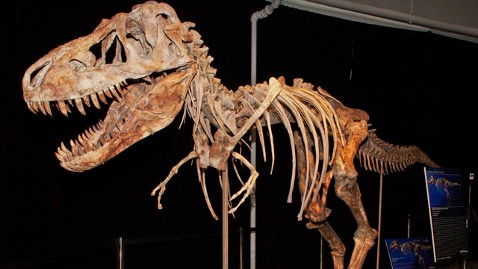U.S. Sues to Force Return of Tyrannosaurus Fossil to Mongolia

AP
The fight is on for the fossil of a dinosaur that roamed the earth more than 70 million years ago.
The United States is seeking the return of a Tyrannosaurus bataar skeleton to Mongolia after officials say the bones were smuggled into the United States.
The lawsuit filed in New York says that the skeleton of the Tyrannosaurs was imported from Great Britain to Florida in March 2010 and described at the time as being worth $15,000.
The smugglers misrepresented the fossil to customs officials when they illegally imported it into the United States and downgraded its value, according to James T. Hayes Jr., head of the U.S. Immigration and Customs Enforcement's Homeland Security Investigations.
Two months later, it sold at an auction for more than $1 million even though Mongolia's president had obtained a temporary restraining order prohibiting the sale of the bataar skeleton.
Jim Halperin, co-founder of the The Heritage Auctions, a defendant in the lawsuit, said, "We auctioned the Tyrannosaurus bataar conditionally, subject to future court rulings, so this matter is now in the hands of lawyers and politicians."
A June 5 examination by at least five experts specializing in bataars resulted in unanimous agreement that the skeleton was a Tyrannosaurus bataar and almost certainly originated in the Nemegt Basin in Mongolia.
In a news release, Mongolian President Tsakhia Elbegdorj called the skeleton "an important piece of the cultural heritage of the Mongolian people." He was thankful for the legal action taken to recover it.
"Cultural looting and profiteering cannot be tolerated anywhere and this cooperation between our governments is a large step forward to stopping it," he added.
Since 1924, Mongolia has enacted laws declaring fossils to be the property of the government of Mongolia and criminalizing their export from the country. The law states that "paleontological items such as remnants of ancient plants and animals as well as archeological findings that ought to be preserved in museums," according to court documents.
The Associated Press contributed to this report